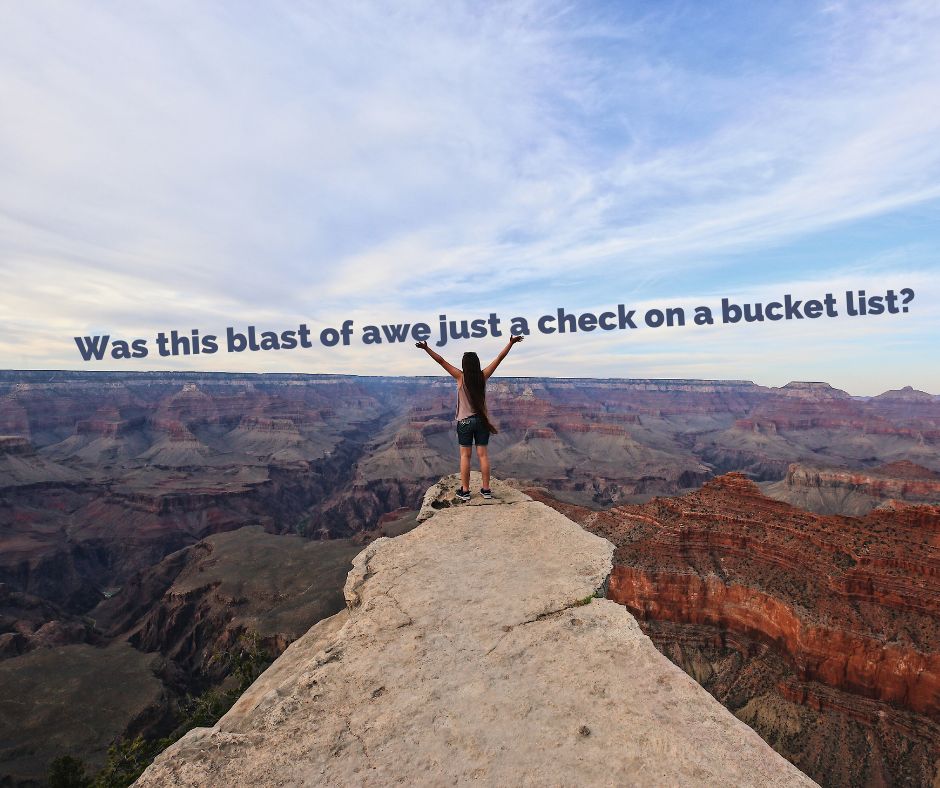Struck By Awe

A few days ago I walked to the rim of the Grand Canyon and looked over the edge. I felt a twinge in my stomach and my mouth dropped slightly open. My first visit—I don’t know what I was expecting. I had seen countless pictures, but of course no flat image, measured in inches, could approach the vastness and fearful depth of this stunning abyss. The mind reels in the immediate recognition that this is a work of art—but on a planetary scale. This was made, created. Wind, water and earthquake have ground out a sweeping masterpiece over something like six million years. The mind rises to encompass the thought, then seizes up. Silence reigns.
In the days after peering over that rim, I kept returning to that first moment when my stomach and my jaw dropped. It may seem odd or corny, but I felt as if that experience was demanding something of me. What was I supposed to do with that blasting of awe? Was it just a check on a bucket list? A way to get a little jolt of terror and delight on an otherwise empty afternoon?
Rainer Marie Rilke’s poem, “Archaic Torso of Apollo”, presents the reader with a shattered bust of the ancient god. Headless, quadriplegic, it would seem lifeless, but somehow the torso is suffused with an inner light. The burning eyes have been lost to time and decay, the poet says, and yet from the marbled flesh Apollo’s gaze penetrates the one who stands before it. Now it is not you who sees the statue, but the statue who sees you. To stand in the presence of beauty, Rilke believed, is to stand before God, and that entails a moral imperative. You may have thought you were free to just behold beauty and walk away, but the poem ends with these words: “You must change your life.”
I think that is what happened to me at the rim of the Grand Canyon. I went to see and was penetrated by other eyes. I went a tourist and left a pilgrim. And if I am to change my life, it will happen by the grace of God-as-Beauty.
Archaic Torso of Apollo
-Rainer Marie Rilke (1875-1926)
We cannot know his legendary head
with eyes like ripening fruit. And yet his torso
is still suffused with brilliance from inside,
like a lamp, in which his gaze, now turned to low,
gleams in all its power. Otherwise
the curved breast could not dazzle you so, nor could
a smile run through the placid hips and thighs
to that dark center where procreation flared.
Otherwise this stone would seem defaced
beneath the translucent cascade of the shoulders
and would not glisten like a wild beast’s fur:
would not, from all the borders of itself,
burst like a star: for here there is no place
that does not see you. You must change your life.
I’ve had that same feeling. The first time I remember it was sitting on a rock next to Chalk Pond. The pond was so still that the starry sky was above and below at the same time – and I bore witness to both. Thanks, David. Peace.
I love that image of the starry sky both above and below. Thanks for that epiphany.
To get to the Grand Canyon I had driven most of the day across a boring, faceless desert. I parked my car right at the rim, casually got out of the car, close to sunset, and walked the few feet to the rim. When I got to the rim, I was stunned… almost in shock.. I had no idea what to make of it. And the changing colors as the sun set. I’m sure my experience was not unique.
No, I don’t think but was unique at all. That sense of awe is universal.
Thank you. Your epiphany will stick with me. I’m always grappling with what to make of overwhelming beauty and awe – and now I have something tucked away for the next time…You must change your life, Cathy.
I hadn’t thought of an aesthetic mandate. I often think of ugliness that way, social or moral, systemic ugliness: I must get out there and fix this! But beauty, too, has its imperative. At the very least, a change in my life is a way of saying thank you to the Creator, mirroring in my life the beauty I see in creation.
I think for Rilke beauty is a manifestation of God, and so maybe ugliness and foulness are a manifestation of the malign.
David
I, too, was a Canyon convert. Spent almost three weeks on the river in the early ’70’s. But it was that first astonishment at the rim that has remained seared in my soul … sometimes dimmer than others. The awe never really leaves you. The timelessness makes us feel ephemeral, humble and small… thanks for channeling it back!
Now if we could just get some of our political leaders to visit….
Yes—-it is like peering at a black hole thousands of times larger than our galaxy—that kind of smallness and humility, as you say. Timelessness is part of that state of awe—thanks for mentioning that.
It has been six years since I walked to the rim of the Grand Canyon and was totally dumbstruck. (“Soulstruck,” if you will.) I involuntarily gasped and my knees went weak. I had no idea that I would have that reaction. Reading your message, I re-experienced the wonder and awe that became a physical and spiritual experience that I did not expect. It occurs to me that I have seen many awe-inspiring structures built by human beings, but nothing has moved me like the Grand Canyon. Thanks again for sharing.
Soulstruck—I like that. Thank you